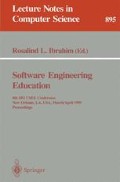Abstract
It is becoming quite apparent that knowledge of computer science and software engineering alone is inadequate for the practising software engineer to be truly successful in an industrial setting. Often in practice, “programmers” lack knowledge of the foundation concepts of computer science and software engineering. The result is that it is difficult to guarantee the production of high quality systems to fixed deadlines. Through discussions with members of an industry-university coalition and more than twenty years of observation, the author has observed that in order for a software engineer to be successful in all aspects, she requires a good amount of knowledge beyond that of computer science and software engineering.
In this paper the author proposes a five item set of essential knowledge for the practising software engineer. These five areas of knowledge and capability are necessary for the software engineer to achieve broad competency. They are:
-
1.
Systems and software engineering and computer science
-
2.
Hardware platform-specific knowledge,
-
3.
Application domain,
-
4.
Personal and interpersonal skills, ethics, and
-
5.
Business culture.
The features of this knowledge base are elaborated. Additionally a partitioning of educational responsibility is proposed between university and industry. The author discusses some preliminary concepts for a university-industry education collaboration which would benefit both classes of institutions as well as noticeably increase the first time success of new software engineering graduates.
Director (on leave)
Preview
Unable to display preview. Download preview PDF.
References
“ACM Code of Ethics and Professional Conduct, draft”, CACM, Vol. 35, No. 5, May 1992
“ACM Model High School Computer Science Curriculum, Task Force of the Pre-College Commission of the Education Board of the ACM,” CACM, Vol. 36, No. 5, May 1993
Mark Ardis, “The Evolution of Wang Institute's Master of Software Engineering Program,” IEEE Trans. on Software Engineering, Vol. SE-13, No. 11, Nov. 1987 pp. 1149–1155
Victor Basili, Frank McGarry, and Dana Hall, “Starting an Experience Factory,” special tutorial at the 17th Annual Software Engineering Workshop, Dec. 1992, NASA GSFC, Greenbelt, Maryland
Frank P. Coyle, Edward Forest, and Murat M. Tanik, “Meeting the Needs of Industry: SMU's Master's Degree,” Proc. of the 7th SEI CSEE Conference, Jan. 1994, Springer-Verlag, Lecture Notes in Computer Science 750, Jorge L. Diaz-Herrera (Ed.), 1994
—, Scaling Up: A Research Agenda for Software Engineering, Computer Science and Technology Board, National Research Council, National Academy Press, Washington, D.C., 1989
Richard G. Epstein, “The Use of Computer Ethics Scenarios in Software Engineering Education: The Case of the Killer Robot,” Proc. of the 7th SEI CSEE Conference, Jan. 1994, Springer-Verlag, Lecture Notes in Computer Science 750, Jorge L. Diaz-Herrera (Ed.), 1994
Norman Fenton, Shari Lawrence Pfleeger, and Robert Glass, “Science and Substance: A Challenge to Software Engineers,” IEEE Software, Vol. 11, No. 4, July 1994, pp. 86–95
Gary Ford, “1990 SEI Report on Undergraduate Software Engineering Education, ”CMU/SEI-90-TR-3, Software Engineering Institute, March 1990
Gary Ford, “1991 SEI Report on Graduate Software Engineering Education,” CMU/SEI-91-TR-2, Software Engineering Institute, April 1991
Peter Freeman, “Essential Elements of Software Engineering Education Revisited,” IEEE Trans. on Software Engineering, Vol. SE-13, No. 11, Nov. 1987, pp. 1143–1148
Batya Friedman and Peter H. Kahn, Jr., “Educating Computer Scientists: Linking the Social and the Technical,” CACM, Vol. 37, No. 1, January 1994, pp. 65–70
Jared T. Freeman, Thomas R. Riedl, Julian S. Weitzenfeld, Gary A. Klein, and John Musa, “Instruction for Software Engineering Expertise,” Proc. of the Software Engineering Education SEI Conference, October 1991, Springer-Verlag, Lecture Notes in Computer Science 536, J.E. Tomayko (Ed.)
Douglas D. Grant, “Software Engineering Education in the 1990s — The Way Forward,” Proc. of the Software Engineering Education SEI Conference, Oct. 1992, Springer-Verlag, Lecture Notes in Computer Science 640, C. Sledge (Ed.)
Horning, J.J. and Wortman, D.B. “Software Hut: A computer program engineering project in the form of a game”, IEEE Trans. on Software Engineering vol. SE-3, No. 4, July 1977, pp. 325–330
—, “Software Engineering Education Resources — Proceedings of the ACM/IEEE International Workshop on Software Engineering Education,” May 21, 1994, Sorrento, Italy
Frank McGarry, “Experimental Software Engineering — 17 Years of Lessons in the SEL,” Proc. of the 17th Annual Software Engineering Workshop, Dec. 1992, NASA GSFC, Greenbelt, Maryland
John W. Priest, Wayne Bodensteiner, and Nan K. Muir, “A Survey of Educational and Training Needs for Transition of a Product from Development to Manufacturing,” IEEE Trans. on Education, Vol. 37, No. 1, February 1994, pp. 13–22
Karl Reed and Tharam S. Dillon, “An Undergraduate Software Engineering Major Embedded in a Computer Systems Engineering Degree,” Proc. Software Engineering Education SEI Conference 1990, Pittsburgh, PA, April 1990, pp. 49–66
Allen B. Tucker, Ed, “A Summary of the ACM/EEEE-CS Joint Task Force Report-Computing Curricula 1991”, CACM, Vol. 34. No. 6, June 1991, pp. 68–84
Author information
Authors and Affiliations
Editor information
Rights and permissions
Copyright information
© 1995 Springer-Verlag Berlin Heidelberg
About this paper
Cite this paper
Zucconi, L. (1995). Essential knowledge for the practising software engineer and the responsibilities of university and industry for her education. In: Ibrahim, R.L. (eds) Software Engineering Education. CSEE 1995. Lecture Notes in Computer Science, vol 895. Springer, Berlin, Heidelberg. https://doi.org/10.1007/3-540-58951-1_88
Download citation
DOI: https://doi.org/10.1007/3-540-58951-1_88
Published:
Publisher Name: Springer, Berlin, Heidelberg
Print ISBN: 978-3-540-58951-8
Online ISBN: 978-3-540-49167-5
eBook Packages: Springer Book Archive

